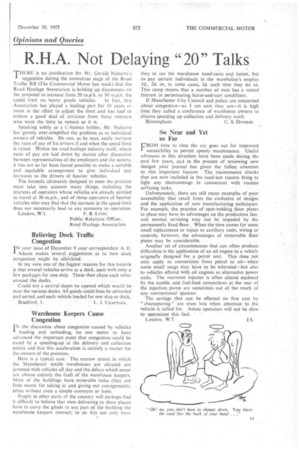R.H.A. Not Delaying "20" Talks
Page 35

If you've noticed an error in this article please click here to report it so we can fix it.
THERE is no justification for Mr. Gerald Naharro's suggestion during the committee stage of the Road Traffic Bill (The Commercial Motor last week) that the Road Haulage Association is holding .up discussions on the proposal to 'increase from 20 m.p.h. to 30 m.p.h. the
speed limit on heavy goods vehicles. In fact, this Association has played a leading part for 10 years or more in the effort to adjust the limit and has had to endure a good deal of criticism from those interests who want the limit to remain as it is. ,
Speaking solely as a C-licence holder, Mr. Nabarro has grossly over-simplified the problem as to individual owners of vehicles. He can, as he says, easily increase the rates of pay of his drivers if and when the speed limit is raised. Within the road haulage industry itself, where rates of pay are laid down by statute after discussion between representatives of the employers and the unions. it has not so far been found possible to make a suitable and equitable arrangement to give individual pay increases to the drivers of heaviervehicles.
The formula ultimately designed to meet the position must take into account many things, including the interests of operators whose vehicles are already entitled to travel at 30 m.p.h., and of those operators of heavier vehicles who may find that the increase in the speed limit does not necessarily lead to any economy in operation.
London, W.1. • F. R. LYON,
Public Relations Officer, Road Haulage Association.
Relieving Dock Traffic Congestion
IN your issue of December 9 your correspondent A. E. Adams makes several suggestion's' as to how dock congestion might be alleviated. • , In my view one'of the biggest reasons for this trouble is that several vehicles arrive at ado-A, each with only a few packages for one ship. These then chase each other
around the docks. . .
Could not a central depot be opened-which would be near the various docks. All goods could then be unloaded and sorted, and each vehicle loaded for one ship or dock.
Bradford, 3. L. J. CHAPNiAN.
Warehouse Keepers Cause Congestion
IN the discussion about congestion caused by vehicles loading and unloading, no one seems to have advanced the important point that congestion could be eased by a speeding-up at the delivery and collection points and that this acceleration' is entirely a matter for the owners of the premises.
Here is a typical case. The narrow streets in which the Manchester textile warehouses are situated are jammed with vehicles all day and the delays which occur are almost entirely the fault of the warehouse keepers. Most of the buildings have miserable holes (they are little more) for taking in and giving out consignments. often without even a simple conveyor or hoist, People in other parts of the country will perhaps find it difficult to believe that men delivering in these places have to carry the gaods to any part of the building the warehouse keepers instruct; to do this not only have they to use the warehouse hand-carts and hoists, but to pay certain individuals in the warehouse's employ Id., 2d. or, in some cases, 3d. each time they do so. This ramp means that a number of men has a vested interest in perpetuating horse-and-cart conditions. If Manchester City Council and police are concerned about congestion—as I am sure they. are—it is high . time they called a conference of warehouse owners to discuss speeding up collection and 'delivery work.
Birmingham. C. S. DUNBAR.
So Near and Yet so Far
FROM time to time the cry goes out for improved
accessibility to permit speedy maintenance. Useful advances in this direction have been made during the past few years, and in the process of reviewing new designs your journal has given the fullest attention to this important feature. The maintenance cheeks that are now included in the road-test reports bring to light any shortcomings in connection with routine set/icing tasks.
Unfortunately, there are still many examples of poor accessibility that result from the evolution of designs and the application of new manufacturing techniques. For example, the practice of spot-welding floor plates in place may have its advantages on the production line, and normal servicing may not be impeded by the permanently fixed floor.. When the time comes for some small replacement or repair to auxiliary units, wiring or controls, however, the advantages of removable floor • plates may be considerable. • Another set of circumstances that can often produce difficulties is the application of an oil engine to'a vehicle originally designed for a petrol unit. This does not only apply to conversions • from petrol to oil—when some small snags may have to be tolerated—but also to vehicles offered with oil engines as alternative power Units. The rearmost injector, is often almost enclosed by the scuttle, and fuel-feed connections at the rear of the injection pump are sometimes out of the reach of any conventional spanner.
The savings that can be effected on first cost. by " cheeseparing " are soon lost, when attention. to the vehicle is called for. Astute operators will not be slow to appreciate this fact.
London, W.7.




















































































